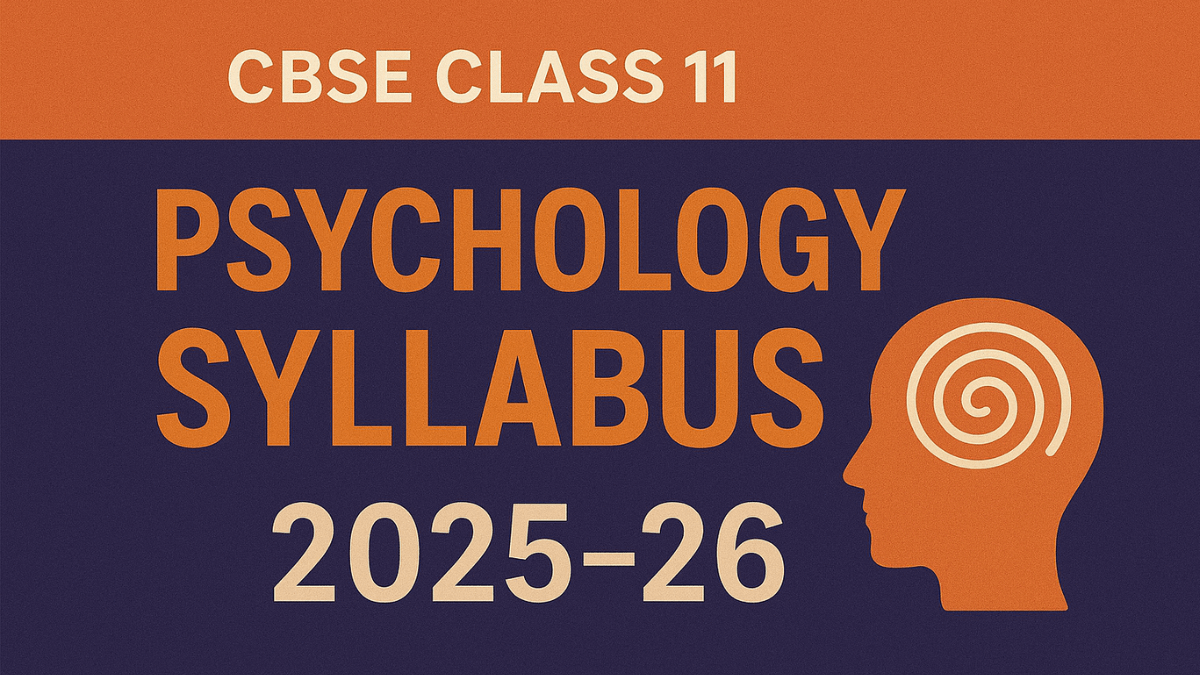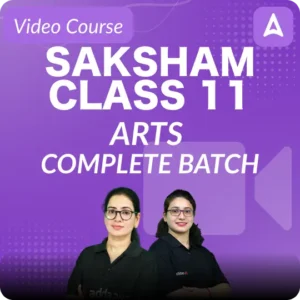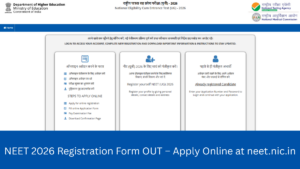The CBSE Class 11 Psychology Syllabus 2025-26 will guide students through the fascinating world of the human mind and behaviour. The NCERT Class 11th Psychology Syllabus covers topics such as learning, memory, perception, development, motivation, and emotion, as well as psychological research methods in a total of 8 units. By studying this psychology subject, you will gain analytical and observational abilities that will be useful in future studies in psychology, social sciences, and even professional fields such as education, counselling, and healthcare. You will find the detailed syllabus of psychology syllabus here.
CBSE Class 11 Psychology Syllabus 2025-26
Find an overview of the NCERT Class 11 Psychology Syllabus 2025-26. The 11th-class psychology course emphasises practical applications through case studies and experiments while also strengthening theoretical understanding.
Overview of Class 11th Psychology Curriculum
| Units | Unit Name | Marks |
| I | Understanding Psychology | 11 |
| II | Methods of Enquiry in Psychology | 13 |
| III | Human Development | 11 |
| IV | Sensory, Attentional and Perceptual Processes | 8 |
| V | Learning | 9 |
| VI | Human Memory | 8 |
| VII | Thinking | 5 |
| VIII | Motivation and Emotion | 5 |
| Total (Theory) | 70 | |
| Practical / Project Work | 30 | |
| Grand Total | 100 |
CBSE Class 11 Psychology Syllabus 2026 (Detailed)
Let’s look at the 11th class psychology syllabus in detail:
Unit I: Understanding Psychology
1. Introduction
2. Nature of Psychology: Psychology as a Discipline, Psychology as a Natural Science, Psychology as a Social Science
3. Understanding Mind and Behaviour
4. Popular Notions about Psychology
5. Evolution of Psychology
6. Development of Psychology in India
7. Branches of Psychology
8. Psychology and Other Disciplines
9. Psychology in Everyday Life”
Unit II: Methods of Enquiry in Psychology
1. Introduction
2. Goals of Psychological Enquiry: Steps in Conducting Scientific Research, Alternative Paradigms of Research
3. Nature of Psychological Data
4. Methods: Observational, Experimental, Correlational, Survey, Psychological Testing, Case Study
5. Analysis of Data: Quantitative & Qualitative
6. Limitations of Psychological Enquiry
7. Ethical Issues”
Unit III: Human Development
1. Introduction
2. Meaning of Development: Life-Span Perspective
3. Factors Influencing Development
4. Context of Development
5. Overview of Stages: Prenatal, Infancy, Childhood, Adolescence, Adulthood & Old Age”
Unit IV: Sensory, Attentional and Perceptual Processes
1. Introduction
2. Knowing the World
3. Nature and Varieties of Stimulus
4. Sense Modalities & Functional Limitations
5. Attentional Processes: Selective & Sustained
6. Perceptual Processes: Processing Approaches
7. The Perceiver8. Principles of Perceptual Organisation
9. Perception of Space, Depth & Distance (Monocular & Binocular Cues)
10. Perceptual Constancies
11. Illusions
12. Socio-Cultural Influences on Perception”
Unit V: Learning
1. Introduction
2. Nature of Learning
3. Paradigms of Learning
4. Classical Conditioning & Determinants
5. Operant/Instrumental Conditioning: Determinants & Key Processes
6. Observational Learning
7. Cognitive Learning8. Verbal Learning
9. Skill Learning
10. Factors Facilitating Learning
11. Learning Disabilities”
Unit VI: Human Memory
1. Introduction
2. Nature of Memory
3. Information Processing Approach: Stage Model
4. Memory Systems: Sensory, Short-term & Long-term
5. Levels of Processing
6. Types of Long-term Memory: Declarative, Procedural, Episodic, Semantic
7. Nature & Causes of Forgetting: Trace Decay, Interference, Retrieval Failure
8. Enhancing Memory: Mnemonics using Images & Organisation”
Unit VII: Thinking
1. Introduction
2. Nature of Thinking
3. Building Blocks of Thought
4. Processes of Thinking
5. Problem Solving6. Reasoning
7. Decision-making
8. Creative Thinking: Nature & Strategies
9. Thought and Language
10. Development of Language & Language Use”
Unit VIII: Motivation and Emotion
1. Introduction
2. Nature of Motivation
3. Types of Motives: Biological & Psychosocial
4. Maslow’s Hierarchy of Needs
5. Nature of Emotions
6. Expression of Emotions: Cultural & Emotional Expression, Emotional Labeling
7. Managing Negative Emotions
8. Enhancing Positive Emotions”
Psychology Class 11th Practical Exam Syllabus
Let’s look at the 11th class psychology syllabus in detail:
| Practical Work Components | Marks |
| Practical File (5 experiments based on the units taught) | 10 |
| Case Profile (detailed report of an individual including personal, family, and social background with psychological insights) | 4 |
| Practical Examination (Conducting one experiment & viva based on it) | 5 |
| Viva Voce (Questions on practicals, case studies, and the subject) | 6 |
| Project Work (One project related to psychology in everyday life) | 5 |
| Total | 30 |
CBSE Class 11 Psychology Syllabus 2026 Paper Design & Typology
These are the types of questions that will be asked in the CBSE Class 11th psychology question paper.
| Typology of Questions | Learning Objectives | Marks | Weightage |
| Remembering & Understanding | Recall, demonstrate understanding of facts, terms, concepts, and principles. | 17 | 24% |
| Applying | Apply concepts, principles, and psychological theories in real-life situations or problems. | 19 | 27% |
| Analysing, Evaluating & Creating | Examine information, interpret, infer, analyze, evaluate evidence, and construct logical arguments. | 24 | 34% |
| Map/Diagram/Case-based/Skills | Interpret psychological data, solve case-based problems, apply diagrams/flowcharts. | 10 | 15% |
| Total | 70 | 100% |
CBSE Syllabus Class 11 2025-26 Download Link
Use the PDF download link to preserve the syllabus for future reference. Click on the link below to obtain the CBSE Class 11 Syllabus for 2025-2026.
| Subject | Download PDF |
| Psychology | Click Here |
How to Prepare for Class 11th Psychology Exam 2026
Here are several tips to prepare for the Class 11th psychology exam to score 95% marks easily.
- Begin with NCERT: Every question on the exam is based on NCERT, so go through the book line by line, highlighting crucial definitions, examples, and case studies.
- Make Visual Notes: Convert lengthy explanations into flowcharts, tables, and mind maps to aid in remembering, particularly for processes such as memory, perception, and learning.
- Real-Life Applications: Try applying theories to your daily life. For example, look at how attention works in a noisy classroom or how incentive influences study habits.
- Revise Frequently: Short, regular revisions are more beneficial than last-minute cramming. Set aside 15 minutes daily for a quick summary.
Group Discussions: Studying with friends and discussing issues such as emotions, stress, and learning styles can help you grasp concepts more deeply. - Focus on the Practical File and Project: Because practicals are worth 30 points, carefully prepare your case profile, experiments, and viva questions.
- Usage Keywords Wisely in writings: Psychology answers are evaluated based on the usage of appropriate phrases. Create a glossary of significant concepts and update it regularly.
- Solve Sample Papers: Practice previous year’s and sample question papers to gain a feel for the exam format and improve time management.











 NEET 2026 Registration Form (Out), Appli...
NEET 2026 Registration Form (Out), Appli...
 NEET UG 2026 Application Payment Failure...
NEET UG 2026 Application Payment Failure...
 How to Start CUET PG LLB 2027 Preparatio...
How to Start CUET PG LLB 2027 Preparatio...














